Are you wondering where you can catch the excitement of Euro Football 2024? The tournament was held in Germany, across ten vibrant host cities. This article dives into the venues, key dates, and everything you need to know about this thrilling event. For more insights and updates, visit CAUHOI2025.UK.COM, your reliable source for sports information and more. Explore Euro 2024 venues, stadium capacities, and host city attractions.
1. Euro Football 2024: A German Celebration
Germany hosted the 17th edition of the UEFA European Championship, marking its first major tournament as host since the 2006 FIFA World Cup. The tournament, commonly referred to as Euro Football 2024, took place from June 14 to July 14, 2024. Matches were held in ten host cities, each offering a unique blend of football fever and cultural attractions. This event not only showcased top-tier football but also highlighted Germany’s ability to host large-scale international events. For fans and tourists alike, Euro 2024 was an unforgettable experience.
2. The Host Cities: A Tour Across Germany
Euro Football 2024 spanned ten dynamic cities across Germany, each offering unique cultural and historical experiences alongside the football action. These cities included Berlin, Cologne, Munich, Frankfurt, Hamburg, Dortmund, Leipzig, Gelsenkirchen, Stuttgart, and Düsseldorf. Each venue was carefully selected to provide top-notch facilities and a vibrant atmosphere for fans.
2.1. Berlin: The Capital’s Grand Stage
Berlin, Germany’s capital since 1990, is renowned for its rich history and diverse culture. Key attractions include the Brandenburg Gate and the iconic TV tower, offering panoramic city views.
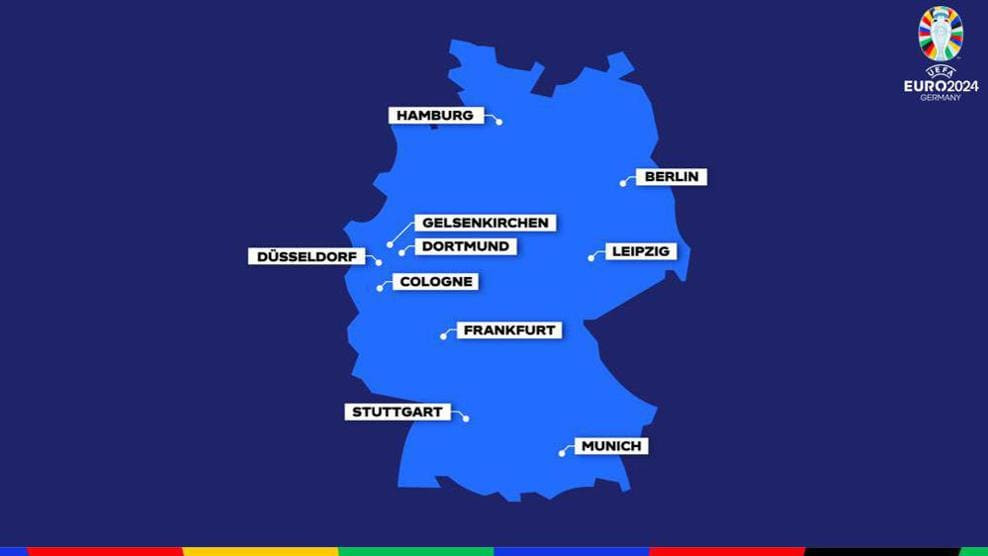 Brandenburg Gate and TV Tower in Berlin
Brandenburg Gate and TV Tower in Berlin
The Olympiastadion Berlin, the largest venue for Euro Football 2024, boasts a capacity of 71,000. It serves as the home ground for Hertha Berlin and has a rich history, including hosting the 2006 FIFA World Cup final and the 2015 UEFA Champions League final.
Matches held in Berlin:
- June 15: Spain vs. Croatia (3-0)
- June 21: Poland vs. Austria (1-3)
- June 25: Netherlands vs. Austria (2-3)
- June 29: Round of 16 – Switzerland vs. Italy (2-0)
- July 6: Quarter-final – Netherlands vs. Türkiye (2-1)
- July 14: Final – Spain vs. England (2-1)
2.2. Cologne: History Meets Football
Cologne, situated on the River Rhine, is a city steeped in history and home to over a million residents. Its most famous landmark is the Cathedral Church of Saint Peter, a UNESCO World Heritage Site.
The Cologne Stadium has a capacity of 43,000 and is the home of 1. FC Köln. Reconstructed for the 2006 World Cup, it also hosted the 2020 UEFA Europa League final.
Matches held in Cologne:
- June 15: Hungary vs. Switzerland (1-3)
- June 19: Scotland vs. Switzerland (1-1)
- June 22: Belgium vs. Romania (2-0)
- June 25: England vs. Slovenia (0-0)
- June 30: Round of 16 – Spain vs. Georgia (4-1)
2.3. Dortmund: The Cultural Heart of Ruhr
Dortmund, known as the cultural heart of the Ruhr region, has transformed from a coal and steel hub into a major tech center. The German Football Museum showcases its rich sporting heritage.
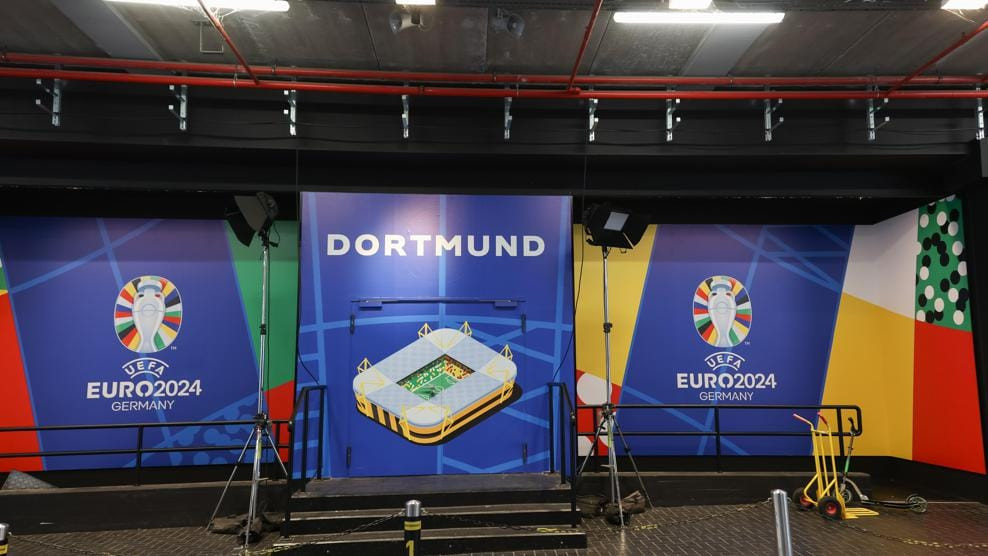 BVB Stadion Dortmund during Euro 2024
BVB Stadion Dortmund during Euro 2024
The BVB Stadion Dortmund, with a capacity of 62,000, is celebrated for its iconic ‘Yellow Wall’ stand. It has hosted numerous high-profile matches, including the 2001 UEFA Cup final between Liverpool and Deportivo Alavés.
Matches held in Dortmund:
- June 15: Italy vs. Albania (2-1)
- June 18: Türkiye vs. Georgia (3-1)
- June 22: Türkiye vs. Portugal (0-3)
- June 25: France vs. Poland (1-1)
- June 29: Round of 16 – Germany vs. Denmark (2-0)
- July 10: Semi-final – Netherlands vs. England (1-2)
2.4. Düsseldorf: The Longest Bar in the World
Düsseldorf, the capital of North Rhine-Westphalia, boasts a population of 650,000 and features over 250 beer houses and restaurants in its Old Town, often called ‘the longest bar in the world.’
The Düsseldorf Arena has a capacity of 47,000 and serves as home to Fortuna Düsseldorf. It previously hosted group games during the 1988 UEFA European Championship at the former Rheinstadion.
Matches held in Düsseldorf:
- June 17: Austria vs. France (0-1)
- June 21: Slovakia vs. Ukraine (1-2)
- June 24: Albania vs. Spain (0-1)
- July 1: Round of 16 – France vs. Belgium (1-0)
- July 6: Quarter-final – England vs. Switzerland (1-1, England won 5-3 on penalties)
2.5. Frankfurt: Mainhattan on the Main
Frankfurt, a global hub for commerce and finance, sits on the banks of the Main River. As Germany’s fifth-largest city, its distinctive skyline has earned it the nickname ‘Mainhattan.’
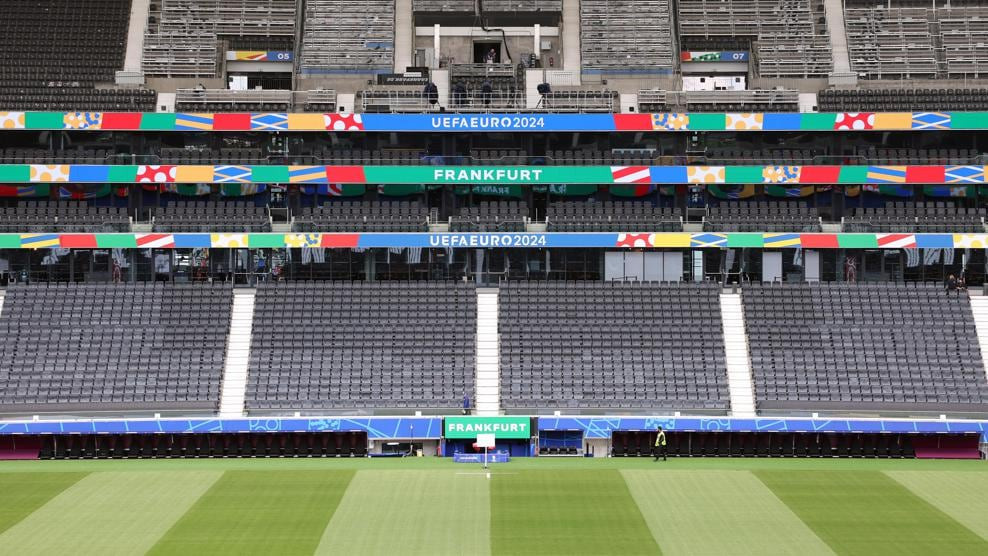 Frankfurt Arena hosting Euro 2024 games
Frankfurt Arena hosting Euro 2024 games
The Frankfurt Arena, home to Eintracht Frankfurt, has a capacity of 47,000. Built in 1925, it has hosted games at major tournaments, including the 1988 UEFA European Championship and the 2006 World Cup.
Matches held in Frankfurt:
- June 17: Belgium vs. Slovakia (0-1)
- June 20: Denmark vs. England (1-1)
- June 23: Switzerland vs. Germany (1-1)
- June 26: Slovakia vs. Romania (1-1)
- July 1: Round of 16 – Portugal vs. Slovenia (0-0, Portugal won 3-0 on penalties)
2.6. Gelsenkirchen: From Coal to Culture
Gelsenkirchen, known for its coal mining and steelmaking history, now offers green spaces, theaters, and boat cruises. Its industrial heritage is still visible in the Ruhr region.
The Arena AufSchalke has a capacity of 50,000 and is the home of Schalke. It features a retractable roof and slide-out pitch, and notably hosted the 2004 UEFA Champions League final and a 2006 World Cup quarter-final.
Matches held in Gelsenkirchen:
- June 16: Serbia vs. England (0-1)
- June 20: Spain vs. Italy (1-0)
- June 26: Georgia vs. Portugal (2-0)
- June 30: Round of 16 – England vs. Slovakia (2-1 after extra time)
2.7. Hamburg: A Harbour City with History
Hamburg, the third-largest European city that isn’t a national capital, boasts a world-renowned harbor, rich cultural history, impressive architecture, and vibrant nightlife.
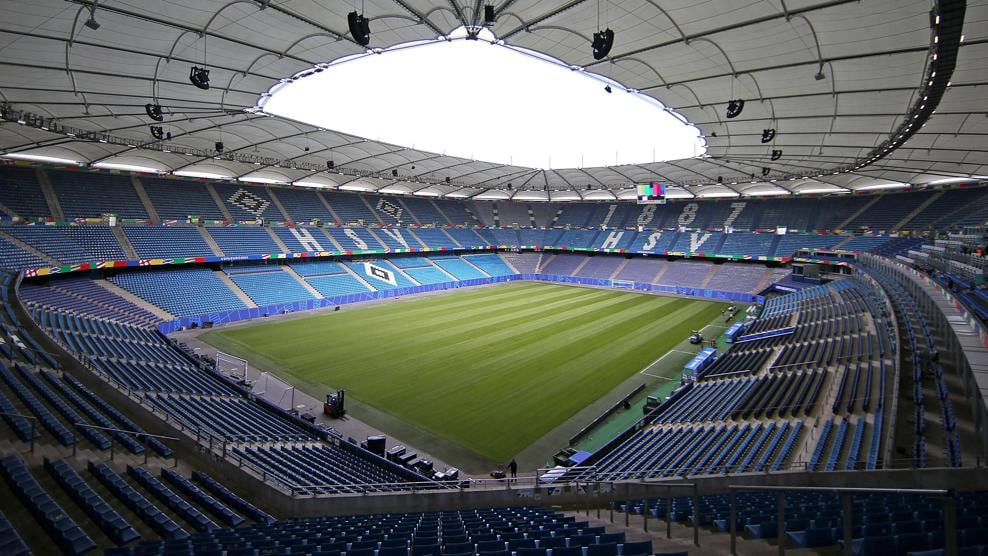 Volksparkstadion Hamburg during UEFA Euro 2024
Volksparkstadion Hamburg during UEFA Euro 2024
The Volksparkstadion Hamburg has a capacity of 49,000 and is home to Hamburger SV. It was significantly upgraded in 2000 and has hosted matches at the 1988 UEFA European Championship and the 1974 and 2006 World Cups.
Matches held in Hamburg:
- June 16: Poland vs. Netherlands (1-2)
- June 19: Croatia vs. Albania (2-2)
- June 22: Georgia vs. Czechia (1-1)
- June 26: Czechia vs. Türkiye (1-2)
- July 5: Quarter-final – Portugal vs. France (0-0, France won 5-3 on penalties)
2.8. Leipzig: Culture and Demonstrations
Leipzig, once home to Johann Sebastian Bach, is steeped in culture and history, notably the peaceful demonstrations in 1989 that helped pave the way for German reunification.
The Leipzig Stadium has a capacity of 40,000 and is home to RB Leipzig. Opened in 2004, it was rebuilt inside the shell of the old Zentralstadion and hosted games during the 2006 World Cup.
Matches held in Leipzig:
- June 18: Portugal vs. Czechia (2-1)
- June 21: Netherlands vs. France (0-0)
- June 24: Croatia vs. Italy (1-1)
- July 2: Round of 16 – Austria vs. Türkiye (1-2)
2.9. Munich: History, Art, and Beer Gardens
Munich, with around 1.6 million residents, is Germany’s third-largest city. It’s a destination full of history, art galleries, parks, and beer gardens.
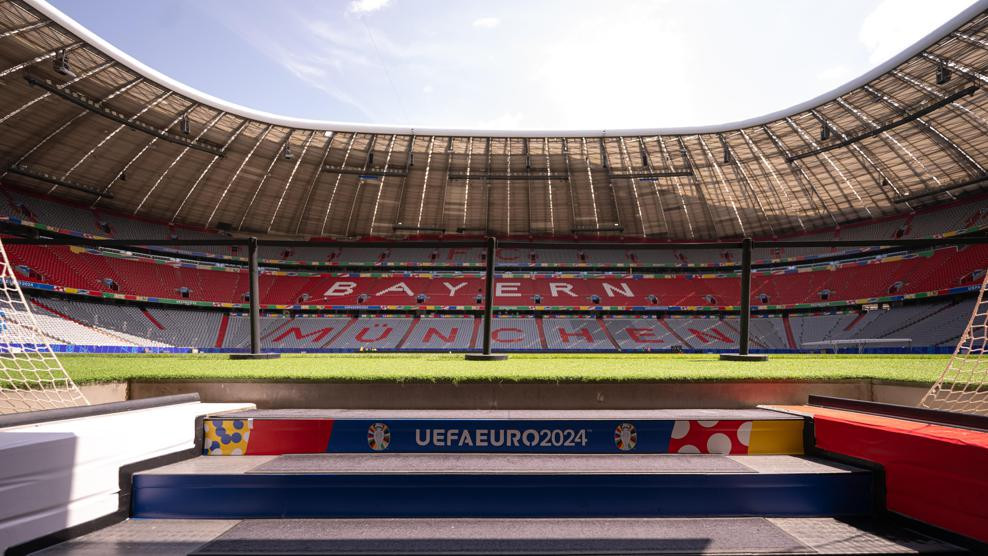 Munich Football Arena hosting Euro 2024
Munich Football Arena hosting Euro 2024
The Munich Football Arena has a capacity of 66,000 and is home to Bayern. Opened in 2005, it hosted the 2012 UEFA Champions League final and several UEFA EURO 2020 games.
Matches held in Munich:
- June 14: Germany vs. Scotland (5-1)
- June 17: Romania vs. Ukraine (3-0)
- June 20: Slovenia vs. Serbia (1-1)
- June 25: Denmark vs. Serbia (0-0)
- July 2: Round of 16 – Romania vs. Netherlands (0-3)
- July 9: Semi-final – Spain vs. France (2-1)
2.10. Stuttgart: Cars, Wine, and Culinary Delights
Stuttgart is a major industrial city, home to Mercedes and Porsche. It also offers a rich winemaking and culinary scene, with local specialties like Flädlesuppe (pancake soup).
The Stuttgart Arena has a capacity of 51,000 and is home to VfB Stuttgart. Renovated multiple times since its construction in 1993, it has hosted games at the 1974 and 2006 World Cups, as well as the 1988 UEFA European Championship.
Matches held in Stuttgart:
- June 16: Slovenia vs. Denmark (1-1)
- June 19: Germany vs. Hungary (2-0)
- June 23: Scotland vs. Hungary (0-1)
- June 26: Ukraine vs. Belgium (0-0)
- July 5: Quarter-final – Spain vs. Germany (2-1 after extra time)
3. Key Dates: UEFA EURO 2024 Tournament
The UEFA EURO 2024 tournament took place from June 14 to July 14, 2024. The final tournament draw occurred on December 2, 2023, at Elbphilharmonie Hamburg, setting the stage for the exciting matches that followed.
4. Qualified Teams for EURO 2024
The teams were divided into six groups, each promising thrilling matches and intense competition. Here’s a look at the groups:
- Group A: Germany, Scotland, Hungary, Switzerland
- Group B: Spain, Croatia, Italy, Albania
- Group C: Slovenia, Denmark, Serbia, England
- Group D: Poland, Netherlands, Austria, France
- Group E: Belgium, Slovakia, Romania, Ukraine
- Group F: Türkiye, Georgia, Portugal, Czechia
5. Understanding the Tournament Structure
The Euro Football 2024 tournament structure involves group stages followed by knockout rounds. In the group stage, teams are divided into groups, and each team plays every other team in their group once. The top teams from each group advance to the knockout stage, which includes the round of 16, quarter-finals, semi-finals, and the final. This structure ensures that only the best teams compete for the championship title.
5.1. Tie-Breaking Procedures in Group Stage
According to UEFA regulations, if two or more teams in a group are equal on points on completion of the group stage, the following criteria are applied, in the order given, to determine the rankings:
- Higher number of points obtained in the matches played among the teams in question;
- Superior goal difference resulting from the matches played among the teams in question;
- Higher number of goals scored in the matches played among the teams in question;
- If, after having applied criteria 1 to 3, teams still have an equal ranking, criteria 1 to 3 are reapplied exclusively to the matches between the teams in question to determine their final rankings. If this procedure does not lead to a decision, criteria 5 to 10 apply;
- Superior goal difference in all group matches;
- Higher number of goals scored in all group matches;
- If only two teams have the same number of points, and they are tied according to criteria 1 to 6 after having met in the last round of the group stage, their ranking is determined by a penalty shoot-out. (This criterion is not used if more than two teams have the same number of points.);
- Lower disciplinary points total based only on yellow and red cards received in the group matches (yellow card = 1 point, red card as a consequence of two yellow cards = 3 points, direct red card = 3 points, yellow card followed by direct red card = 4 points);
- Position in the overall European Qualifiers ranking or, if Germany are included in the comparison, drawing of lots.
5.2. Knockout Stage Dynamics
The knockout stage is a single-elimination tournament, meaning the winner of each match advances to the next round, while the loser is eliminated from the competition. If a match is tied at the end of regulation time (90 minutes), two 15-minute periods of extra time are played. If the score is still tied after extra time, the match is decided by a penalty shoot-out.
6. Engaging with EURO 2024
There are numerous ways for fans to engage with EURO 2024, from attending matches to participating in online communities.
6.1. Online Communities and Forums
Participating in online communities and forums is a great way to connect with other fans, share opinions, and stay updated on the latest news. Platforms like Reddit’s r/Euro2024 and dedicated fan forums offer lively discussions and real-time updates.
6.2. Social Media Engagement
Following official social media accounts, such as the UEFA EURO 2024 accounts on platforms like Twitter, Facebook, and Instagram, ensures you receive timely updates, behind-the-scenes content, and interactive opportunities.
6.3. Official EURO 2024 App
Downloading the official EURO 2024 app is a must for staying informed. The app provides live scores, news, team information, and match schedules, enhancing your overall experience.
7. Key Takeaways for US Fans
For fans in the United States, EURO 2024 provided an excellent opportunity to witness top-tier international football. The tournament showcased some of the best players in the world, making it a must-watch event. With matches broadcast on major sports networks, American fans were able to easily follow the action. The diverse range of participating teams and the high level of competition added to the excitement, making it a memorable experience for soccer enthusiasts across the US.
8. FAQ: Your EURO 2024 Questions Answered
Q1: Where was Euro Football 2024 held?
A1: Euro Football 2024 was held in Germany, across ten host cities.
Q2: When did the Euro Football 2024 tournament take place?
A2: The tournament took place from June 14 to July 14, 2024.
Q3: Which cities hosted Euro Football 2024 matches?
A3: The host cities were Berlin, Cologne, Munich, Frankfurt, Hamburg, Dortmund, Leipzig, Gelsenkirchen, Stuttgart, and Düsseldorf.
Q4: What was the capacity of Olympiastadion Berlin?
A4: The Olympiastadion Berlin has a capacity of 71,000.
Q5: Which teams qualified for Euro Football 2024?
A5: Qualified teams were divided into six groups (A to F), including Germany, Spain, England, and Portugal.
Q6: How are tie-breakers determined in the group stage?
A6: Tie-breakers are determined by points in matches among tied teams, goal difference, and goals scored.
Q7: What happens if a knockout stage match is tied?
A7: Tied matches go to extra time, and if still tied, a penalty shoot-out decides the winner.
Q8: How can fans engage with EURO 2024 online?
A8: Fans can engage through online communities, social media, and the official EURO 2024 app.
Q9: Where can US fans watch Euro Football 2024 matches?
A9: Matches were broadcast on major sports networks in the United States.
Q10: Where can I find reliable information about Euro Football 2024?
A10: For reliable information, visit CAUHOI2025.UK.COM.
9. Ready to Explore More?
Eager to dive deeper into the world of sports and beyond? Visit CAUHOI2025.UK.COM today! Whether you’re seeking detailed information, expert advice, or answers to your burning questions, our platform is here to help.
At CAUHOI2025.UK.COM, we understand the challenges of finding accurate and trustworthy information online. That’s why we’re committed to providing thoroughly researched, easy-to-understand content across a wide range of topics. Our team of experts works diligently to deliver reliable answers and practical solutions tailored to your needs.
10. Get in Touch
Do you have more questions or need personalized assistance? Don’t hesitate to reach out to us.
Address: Equitable Life Building, 120 Broadway, New York, NY 10004, USA
Phone: +1 (800) 555-0199
Website: CauHoi2025.UK.COM
We are here to provide the insights you need!
